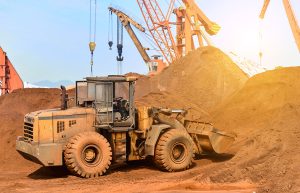Different kinds of technological advances are continuing to make an impact on the construction industry. Year after year, we see the industry trying to find how technology can fit in on the site and how it can make the work quality better.
Some of the technology used in the industry may be far from what you expected to like the AI and software in construction. Now, the industry is encapsulating GPS Tracking which you probably thought was only useful in our vehicles.
Well, most of the roles of GPS in the construction industry involve moving equipment, but there are other surprising functions too that GPS tracking does in the field.
How GPS Tracking in Construction Works
In the past years, GPS technology has proven itself to be a powerful tool in construction. It has numerous functions and one we’ve found out as we test on construction project management software is its integration can help in monitoring. In some of our blogs, we were able to discuss how drones and GPS can be an effective and safer way for equipment and staff monitoring. Much more when their data are automatically submitted to project management software like the Pro Crew Schedule.
If you’re wondering how else GPS helps on the site, here is a rundown of the 5 major roles this technology has in construction:
1.Equipment and Vehicle Security
Equipment and vehicles used in construction are seriously expensive. With that fact, theft becomes a real danger to firms, most especially because one security guard can’t monitor a huge workplace all by himself.
Construction theft has become a common problem in big construction sites. Losing essential tools, machines, vehicles, and equipment doesn’t only mean losing valuable investments but can also lead to severe delays. And it’s not that easy to get replacements, most especially when the project is situated in a rural area.
Clients will then become frustrated. Consequently, project owners lose part of their profit and worse, the trust of the client.
GPS tracking can prevent this kind of unfortunate scenario. A tracking device can be installed on vehicles and equipment can scare thieves away. Tracking devices can also be used for the recovery of your investment if the thieves are successful in stealing them.
GPS technology provides real-time location data depending on the movement of anything it is attached to. You can have the police monitor the information and retrieve your items while apprehending the criminal.
Furthermore, having a GPS tracking device installed in every equipment and vehicle you have on the field will give you peace of mind.
2.Monitor Unsafe Practices Done by Your Crew Members
Unsafe driving practices can lead to huge liability risks and possible costly accidents. One single but severe accidents like crashing a heavy equipment vehicle to another one can cost a lot of money and it still doesn’t include the claims from members who got injured.
Vehicles driven on the site or trucks you use for purchase and delivery should be handled with the highest attention to safety. Much more when these vehicles carry the visual branding of your firm. This can greatly affect your image when the accident happens outside the site.
GPS tracking can be used on vehicles to encourage a safety-conscious culture in your firm.
When your members know that their activities are being monitored, they will try to drive vehicles and operate machines and equipment with precaution. They will take the proper route, follow speed limits, and comply with rules set by your safety officer.
This can be enough to make them more alert and conscious of their behavior when in control of one of your vans or trucks.
3.Reduce Fuel Expenses
There are many ways GPS tracking can help your firm save on fuel expenses. First, when you connect your GPS devices to your construction project management software, you will know which equipment and vehicle are scheduled for operation for the day. If it shows that a vehicle is used when it’s not on the schedule to be used, then you can call the attention of the driver right away. Give them corresponding sanctions so they won’t be tempted again to use vehicles when they aren’t supposed to be used.
Second, by monitoring routes of the vehicles used on the site, you can make a plan on how to cut fuel costs by looking for a more efficient route, plan out shortcuts, or making a better plan on transporting materials.
Advanced GPS tracking devices feature sensors that can let the contractor or project manager know the actual fuel consumption. Some people would take advantage of the bounty of fuel on the site and get some from the stock to use on their private vehicles.
Overall, being able to monitor your actual fuel consumption in your project will help you identify who among your divers are making the most or just wasting petrol. And all these leave you with more to put into upgrading equipment or pay rises.
4.Real-Time Assessment of Productivity Levels
GPS devices aren’t only useful in tracking your vehicles and equipment on the site but also your employees. Asking your members to wear GPS devices can help you see where they are on the site during work hours. Are they spending 20-30 minutes outside the site when they are far from their break time? Are they seen in a station where they aren’t assigned?
To do this, you can choose from the various types of GPS tracking devices like wearable techs such as smartwatches or RFID. You can also use their smartphones so there’s no longer a need for you to buy new devices for tracking their location.
Some may feel uncomfortable knowing that their movements are being monitored but to avoid misunderstandings at the site, you should help them realize that GPS tracking is there to help motivate them to do better in their work and avoid delays that will greatly affect the time and income of everyone working for the firm.
GPS tracking will also help you know what time your employees leave the site. This is helpful to track who really goes overtime and those who go under time. Furthermore, you will know who is missing in their workplaces as it could be a sign that they have already been in an accident.
When you employ GPS tracking on your firm, be sure to teach your members how to deactivate the software when they are already outside of work. This helps them get some peace of mind that you aren’t spying on them during their private time.
5.Accurately Record Data to Avoid Client Disputes
Like drones and surveillance systems, GPS tracking units can continuously record data they are intended to gather and send them straight to your management software. Assign daily folders on your cloud storage so that recordings won’t be cluttered so that when you need them in the future, you can find what you are looking for much easier.
Remember that not all clients will be completely satisfied with your work. He will question your matters about deadlines and costs. In this case, you can present all your data to support your argument.
Also, when you bill your client at the end of the project, you can show him a clear account of how many hours your employees really worked, how much you spent on your equipment, and so on.
Likewise, if a client tries to claim that certain deliveries or tasks were not performed on time, your evidence will prove otherwise.
GPS Tracking Implementation and Getting Employee Consent
Using GPS tracking in the field, most especially on your workers requires permission. Tracking them may make your members feel that they are intruded and can cause them to leave. If you orient them with how they can benefit from using GPS while at work, they might realize the need and allow you to track their every movement at work.As you can see, GPS tracking offers outstanding benefits to you and your employees. They will be motivated to do their part well, save them from being questioned by the auditors of your client, and rescue them if immediately if they ever get into an accident.Give your members a full briefing ahead of time to explain the technology. Do not just implement the technology without their knowledge and consent. Run a trial for a week and get their feedback. The last thing you want to do is alienate your workforce and leave them feeling distrustful or resentful. And if you do that, instead of them being more productive, they can leave you in no time. You may even face legal action if you track them without them knowing.GPS tracking will continue to help companies in the construction industry boost productivity and reduce unnecessary expenses as it evolves in years to come, too.





